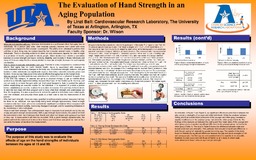
ATTENTION: The works hosted here are being migrated to a new repository that will consolidate resources, improve discoverability, and better show UTA's research impact on the global community. We will update authors as the migration progresses. Please see MavMatrix for more information.
Show simple item record
| dc.contributor.author | Ball, Linzi | en_US |
| dc.date.accessioned | 2011-07-08T18:15:12Z | en_US |
| dc.date.available | 2011-07-08T18:15:12Z | en_US |
| dc.date.copyright | 2011-05 | en_US |
| dc.identifier.uri | http://hdl.handle.net/10106/5614 | en_US |
| dc.description.abstract | Muscular deterioration is a well known effect that aging has on
individuals. As a person gets older, their muscles naturally become worn down and more
atrophied as compared to their younger counterparts. The ability of an individual to perform their
activities of daily living may be compromised by low muscular strength even in healthy older
individuals. There is mounting evidence to show not only endurance capacity but also strength
is a predictor of health, especially in elderly people. Many studies have shown a correlation
between muscular strength and future morbidity, disability, and mortality in these individuals and
many of them are subjected to a steady decline in muscular strength, because the vast majority
are inactive. | en_US |
| dc.description.sponsorship | Wilson, Judy Ph.D. | en_US |
| dc.language.iso | en_US | en_US |
| dc.subject.other | Muscular deterioration | en_US |
| dc.subject.other | Grip strength dynamometer | en_US |
| dc.subject.other | Pinch strength dynamometer | en_US |
| dc.subject.other | Hand Strength | en_US |
| dc.title | The Evaluation of Hand Strength in an Aging Population | en_US |
| dc.type | Presentation | en_US |
| dc.publisher.department | Cardiovascular Research Laboratory, The University
of Texas at Arlington. | en_US |
| dc.publisher.department | Department of Kinesiology, The University of Texas at Arlington. | en_US |
| dc.publisher.department | Exercise Science Research Laboratories, The University of Texas at Arlington. | en_US |
Files in this item
- Name:
- Ball.pdf
- Size:
- 526.9Kb
- Format:
- PDF
This item appears in the following Collection(s)
Show simple item record


